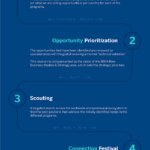What is startup scouting? How to be the chosen fintech
The process of choosing startups in open innovation is proving increasingly difficult in the face of the proliferation of emerging companies globally. BBVA has various scouting mechanisms, and to do this it takes into account factors such as the degree of maturity, whether the solution dovetails with the bank's needs, and the entrepreneurial team's passion.

If you're a startup, at some point you'll probably have wondered what you have to do for a big company to "find you" and to want to work with you on the open innovation mechanism. Through that methodology, large corporations connect with emerging companies to co-create and grow together, mutually providing each other with what they need. For the startup, it's an ideal way to gain momentum, experience and an umbrella under which to grow.
At the same time, it's also a challenge for big businesses to come across the right companies in the vast world of entrepreneurship. The number of startups worldwide is constantly growing, as evidenced by the South Summit map of entrepreneurship, which receives more startup participants every year - in 2019, there were 18% more than the previous year. Therefore, having tools to identify the best ones is essential.
Scouting mechanisms
In recent years several platforms have emerged that use different methods to try to select startups. For example, Test4Startup uses artificial intelligence to determine whether a launch will be successful or not. Meanwhile, Early Metrics acts as a kind of ratings agency, assigning companies a value and providing objective help for decision-making.
As for BBVA, Open Marketplace helps to link startups to those responsible for the most suitable of the bank's business units. "It's a window into the fintech ecosystem where startups can register to be found if their solution fits what the bank is looking for", explains David Martín de Nascimento, External Ecosystems Manager of Open Innovation at BBVA.
"We also work with third parties, players in the ecosystem, from venture capital investors to open innovation specialists. It's a job that involves very intensive research"
First the bank publishes its needs through this platform, as it has done recently with a launch of opportunities, and it carries out an analysis of competencies, or scouting, to select the ones that stand out from among the emerging companies that have put themselves forward.
After this process, the companies pre-selected on the platform come into direct contact with the bank during the Connection Festival, an event at which they can present their business model through a pitch to the various department heads. “Next, the business area keeps delving deeper in later sessions to get to know the business proposals in detail", adds Viñas. Once this phase is complete, companies that meet the requirements are selected to be part of the Fast Track programme, which provides a space to swiftly define and carry out a concept test or pilots with the bank.
However, there are other parallel scouting pathways, as David Martín de Nascimento explains: "We also work with third parties, players in the ecosystem, from venture capital investors (like Anthemis) to open innovation specialists, to allow them to find interesting startups". These companies regularly present us with solutions, so we can keep shortening the list until we have those that best fit the business' stated needs”, adds Marta Viñas Sánchez, head of Internal Ecosystem in the BBVA Open Innovation team.
From BBVA's own Open Innovation ecosystem, contacts and relationships prosper and startups keep appearing, ready to be chosen.
BBVA and the fintech scene
Whether or not to choose an emerging company depends a great deal on its degree of maturity and on how urgently the large company requires its solution. That is precisely one of the advantages of open innovation. "If the bank wants to develop something it needs imminently, but it would take many months to bring it to fruition, and at the same time finds a startup whose solution can be quickly implemented, the answer is obvious", indicates Martín de Nascimento. From a commercial point of view, it's also critical for the startup to have a physical presence in the countries where BBVA has headquarters.
The sub-sector that brings together the greatest proportion of startups from the so-called third wave (they are technologically very advanced and they bring their technological developments and learning to the real world) is fintech, with 8.7% of startups, according to the 2019 Barometer of Entrepreneurship in Spain, created by Ontsi and red.es.
A certain amount of inspiration is also obtained from the scouting process, as Martín de Nascimento explains: "We look closely at the ecosystem and see which financial services are trending, some that perhaps the bank hadn't noticed".
The innate characteristics of a startup
Among the factors to consider when a company is choosing a startup, experts tend to highlight the team, the product and the market. In The Crowd Angel's blog, they point out the importance of analysing who is behind the company: the founders' educational background, their work experience, and whether they have previously had successes or failures as entrepreneurs.
With regard to competitors, there is also the possibility that a product or service is too disruptive, which is why the sector must be well analysed. "A solution can prove to be really ground-breaking, and you have to look at the details to decide whether it is the right time and if the solution fits or not", says Viñas.
"Startups have to have been daring to create a disruptive idea that makes us open our eyes and think laterally
For DealMatrix, a company that analyses startups, scouting is like finding a needle in a haystack, and they highlight aspects like the quality of the founding team, the chemistry between the investor and the entrepreneurs and the levels of communication between the two entities. They also favour the enthusiasm, resistance, adaptability and ambition of the members of the startup.
"Naturally, fintechs must show passion, something that they often start with as entrepreneurs. They also have to have been sufficiently daring to create a disruptive idea that makes us open our eyes and think laterally", suggests Martín de Nascimento.
The same was also expressed by James Caan, entrepreneurship expert and co-founder of VenturesPlus: "At the end of the day it's about showing passion and talent for your business. I want to work with companies that truly believe that they can change the world with their innovation".
